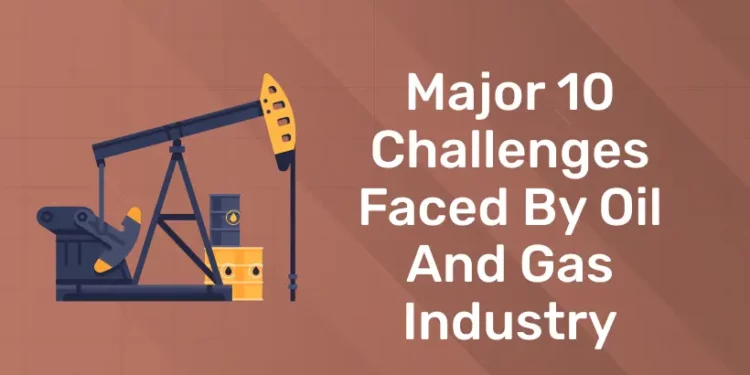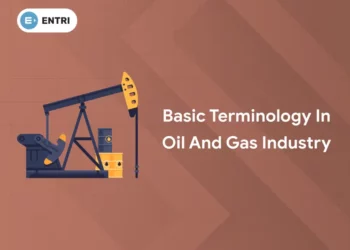Table of Contents
In 2024, a mix of technological, environmental, and economic concerns may present the oil and gas business with a number of challenges. The shift to low-carbon fuels, environmental laws, cybersecurity, greater volatility and unpredictability, and a talent scarcity are some of these problems. In this article here we are discussing the major 10 challenges faced by oil and gas industry. Also the solutions for resolving these challenges faced by the oil and gas industry.
Get Certified! Get Confident! Join our Oil and Gas Course! Today!
Introduction
India’s eighth-largest core industry is the oil and gas sector. Fossil fuels provide for the majority of India’s economic growth. One of the main resource sources in the energy mix is oil and gas. As of April 1, 2019, India’s crude oil refining sector, with an annual capacity of 249.40 MMT, ranked second in Asia.1. Since 2011, India has surpassed South Korea, Japan, and China to become the fourth-largest importer of liquefied natural gas, or LNG.1.
The Indian government has implemented a number of laws that call for 100% foreign direct investment in a number of industries, including refining, natural gas, and petroleum products. As seen by the existence of Reliance Industries Limited (RIL) and Cairn India, it draws investment from both domestic and foreign sources. However, obstacles including laws, lax government policies, sluggish domestic output, and a lack of strong involvement from foreign and private oil and gas companies probably prevent the extent from expanding.
Major Challenges Face by Oil and Gas Industry
1: What is the primary purpose of a refinery in the oil and gas industry?
1. Minimizing costs
One of the main obstacles that the oil and gas sector must overcome in order to produce refined industrial goods from crude oil and refined industrial products at a reduced cost is this. Therefore, oil and gas corporations need to improve the environment and output on sites that are currently operational immediately.
2. Enhancement of Industry Performance
In order for the oil and gas sector to continue providing crude oil and gas, it is now imperative to extend the life of mature installations. While industries are taken into consideration for new transportation sources, extraction and refining are undoubtedly more costly and intricate processes.
3. Adhering to Environmental Regulations
Because the oil and gas sector uses a significant amount of energy and water, it is required to uphold appropriate production, extraction, and distribution laws.
4. An ageing labour force
According to estimates from the Society of Petroleum and Engineers, 50% of the skilled labour force will retire in the next five to seven years, forcing businesses to hire new staff members and contractors who may not be familiar with the facility or have as much experience.
5. Reliability of Equipment
Oil and gas firms frequently employ strategies to improve the dependability of their equipment and reduce downtime, particularly unscheduled downtime. Business is the interval between repair and replacement when operating machinery within the optional range that the original equipment manufacturer (OEM) recommends.
6. Assesment
Equipment for daily, weekly and monthly unit inspections is required by the Oil and Gas Company. A temporary target, moving machinery, operational reading, and a ladder are frequently needed for the inspection.
7. Grand Events
Large-scale events include lockouts, turn-arounds, and equipment isolation. These events need weeks or months of planning because accidents usually happen during start-ups and shut-downs. Oil and gas firms look for methods to cut costs, which contributes to worker safety.
8. Containment
The most catastrophic public occurrences that Oil and Gas Companies deal with are spills and leaks since timely and efficient delivery is of the utmost importance.
9. Strengthen the relationship with oilfield services to enhance logistics
Oil behemoths such as Chevron and ExxonMobil are dependent on outside vendors to deliver specialised equipment and knowledge at various stages of the supply chain for oil and gas. Oil and gas firms, as well as oilfields, play vital roles since a single company’s error can have disastrous consequences. Ineffective teamwork and communication cause the process to lag. According to the white paper’s author, using these cloud-based collaboration platforms can help exploration and production (E&P) companies operate more efficiently. They can exchange forecast information processes, standard inventory measurement procedures, and in-depth planning for field workers.
10. The green technology explosive growth
The use of the oil and gas industry has declined due to the quick development of green technologies such as electrical energy sources and biofuel. As a result, replacing liquid fuels is still challenging, and doing so gradually will take time. There are numerous obstacles facing the oil and gas sector. That will always remain the world’s most vital and vibrant industries.
|
Engineering Upskilling Courses
|
| MEP Course |
How to resolve the challenges
- Maximising the generation of value in order to raise performance.
- Bringing in qualified workers to cover the shortfall and creating a training and development plan to keep the workforce and boost productivity.
- To identify different ways of reducing climate change and environmental effect.
- A fair portion of the wealth to the society and local communities.
- To tackle security difficulties, the best technology solutions are used, such as cybersecurity and video systems.
- Ethical corporate conduct and consistent adherence.
- Enhancing industrial operations’ efficiency.
Entri App – Best Online Oil and Gas Course
Entri’s Oil and Gas Course is a highly acclaimed programme that is tailored to students who aspire to pursue a fulfilling career in the oil and gas industry. It’s perfect for those looking for high-paying employment in India and other nations.
The “Oil and Gas Course” at Entri isn’t like other classes. With this all-inclusive training plan, you will get the skills and knowledge necessary to succeed in the exciting world of oil and gas. You’ll get the chance to put your knowledge to use in real-world situations, which will raise the value of your degree and improve your chances of landing a dream job.
Conclusion
The oil and gas industry is rapidly changing due to a multitude of new technological trends and breakthroughs. These are anticipated to have an impact both upstream, in the areas of exploration and production, and downstream, in the areas of midstream infrastructure, refinery operations, and petroleum chemical facilities. Consequently, as technology and social responsibility advance. In the oil and gas sector, there is a great chance to increase investment, lower risk, and save costs.
Get Certified! Get Confident! Join our Oil and Gas Course! Today!









